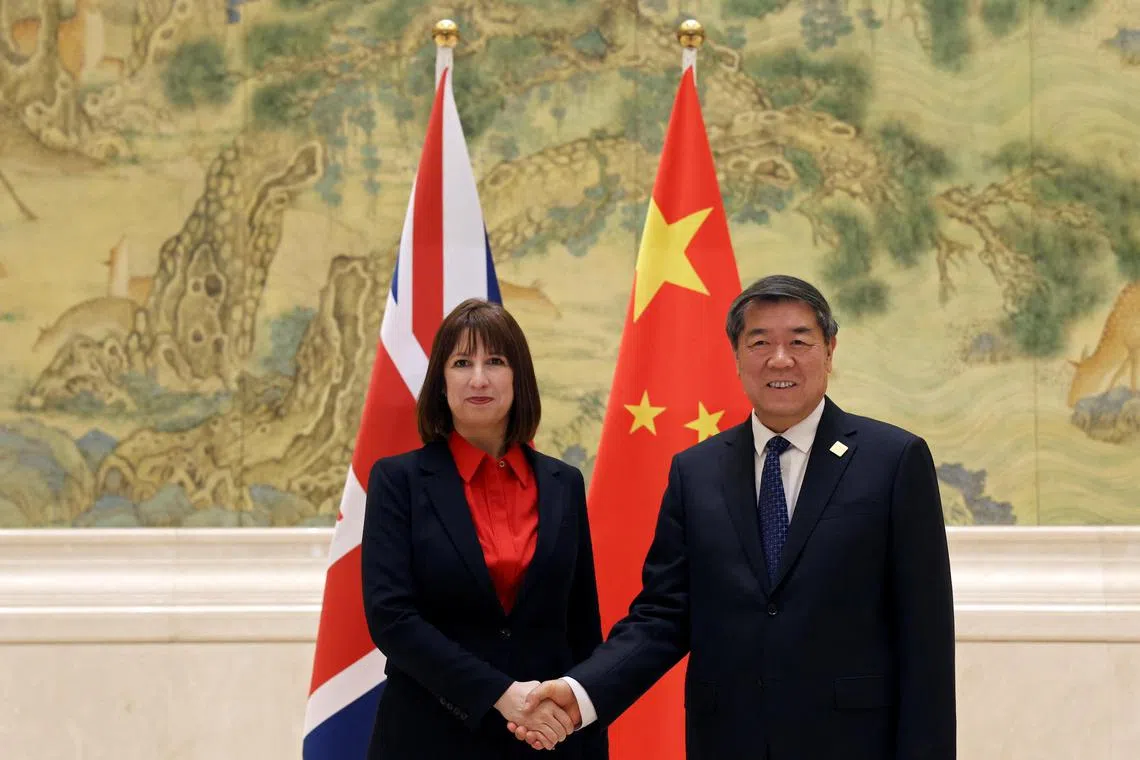UK’s Reeves seeks ‘pragmatic’ relations with China to boost trade
Sign up now: Get insights on Asia's fast-moving developments

Chancellor of the Exchequer Rachel Reeves with Chinese Vice-Premier He Lifeng (right) in Beijing on Jan 11.
PHOTO: REUTERS
BEIJING – Chancellor of the Exchequer Rachel Reeves, facing criticism for travelling to China during financial market turmoil at home, said on Jan 11 that “pragmatic and predictable” relations with Beijing would help boost economic growth and trade.
Under pressure from a sharp rise in British interest rates, Ms Reeves defended her budget at the start of the two-day visit to China, where she is seeking to revive high-level economic and financial talks that have been frozen since 2019.
“The fiscal rules that I set out in my budget in October are non-negotiable and growth is the No. 1 mission of this government to make our country better off,” Ms Reeves told reporters after visiting a Brompton bicycle shop in Beijing.
“That’s why I’m in China to unlock tangible benefits for British businesses exporting and trading around the world to ensure that we have greater access to the second-largest economy in the world.”
The rise in British government borrowing costs, due in part to a global bond sell-off, prompted comparisons with the 2022 “mini-budget” crisis that forced then Prime Minister Liz Truss out of Downing Street.
However, this week’s market moves have been less sharp and there has so far been no evidence of the strain on institutional investors that forced the Bank of England into emergency bond purchases in 2022.
On trade, when asked whether London would follow Washington and Brussels in imposing tariffs on Chinese electric vehicles, Ms Reeves said: “We keep issues under review, but we make decisions in our national interest.”
British car manufacturers “like Jaguar and Land Rover export substantially to Chinese markets, and we want to help them to grow”, she said.
After her bicycle shop visit, Ms Reeves met Chinese Vice-President Han Zheng, telling him it was “important to have open and frank dialogue in areas where we agree, but also in areas where we have different views”.
Members of her delegation, who include Bank of England governor Andrew Bailey, Standard Chartered Bank chairman Jose Vinals and HSBC chairman Mark Tucker, then met their Chinese counterparts led by Vice-Premier He Lifeng.
Mr He urged British financial firms to expand renminbi services and promote deeper renminbi internationalisation, while inviting them to participate in green finance and the pension industry in China.
Ms Reeves, who will be in Shanghai on Jan 12, said she looked forward to China issuing its first overseas sovereign green bond in London in 2025.
Ms Reeves’ visit follows a dialogue in 2024 between Prime Minister Keir Starmer and President Xi Jinping
Ms Reeves told Mr He that Russia’s invasion of Ukraine, rising geopolitical tensions and climate change meant that they faced a much more challenging environment than when their predecessors last met.
“It is important to prevent economic leaps weakening our national security and economic resilience,” she said, adding that both she and Mr He wanted to “find common ground” in this regard.
Mr He said Beijing would work with London to ensure a fair, non-discriminatory business environment for each country’s firms.
The approach taken by the Labour government, elected in July, contrasts with that of the previous Conservative administration, which took a robust approach to differences with China – particularly over human rights, Hong Kong and allegations of Chinese espionage.
Asked on Jan 9 if Ms Reeves would raise human rights issues, Mr Starmer’s spokesperson said her visit would fit with London’s stance that it would take a strategic approach to China and challenge it “robustly” when necessary.
Mr Starmer has long described his desire to build a relationship with China that is “rooted in the UK’s national interests” by boosting trade, a task that may become more difficult if US President-elect Donald Trump follows through on his threat to impose tariffs on all imports.
China is Britain’s fourth-largest trading partner, accounting for goods and services trade worth almost £113 billion (S$189.2 billion). REUTERS


